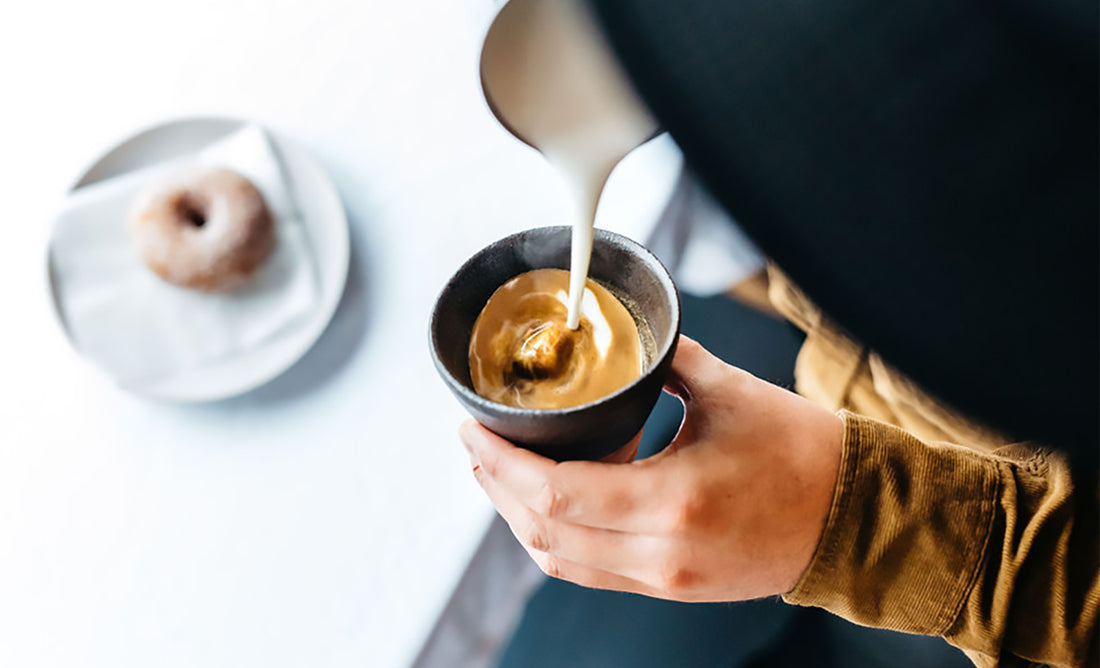We love Yallah Coffee. Our favouritism is as much for the flavour of their beans as it is for their progressive, innovative ethos and the imaginative illustrations by Josh Vyvyan that mark their presence all around Cornwall. Their roastery is part of the creative community based on Argal Farm in South Cornwall, founded and built by designer James Smith. They’re in good company here on the farm with Francli, New Dawn Traders, Cut by Beam and others. They also have a new cafe in St Ives and you’ll see their bags of beans in cafes all across the county and beyond. As of this Summer, Yallah are roasting sail-traded beans, shipped to the UK by the New Dawn Traders’ Gallant ship.
We wanted to collaborate on a few drinks to be served in the Yallah cafe and for the pages of our online cocktail book, using their new sail-traded coffee beans Las Brisas, as well as the New Dawn Traders’ panela, both from Colombia.

We spent time with Josh, Rich and the Yallah team at the roastery, first exploring a roasting process. Different roasting profiles are used depending on the bean and what the coffee will be used for. A lighter roasting profile results in a stronger flavour and tends to be used for their more floral beans, and for any beans that will undergo a cold extraction process.

Alex Geldenhuys of the New Dawn Traders told us about the intricacies of panela, which is raw, unrefined cane sugar which is often combined with coffee. Like coffee, cheese and wine, the taste of panela varies slightly region to region and is characteristic of where it's grown. Some panela is fruitier or more floral, while others have a more caramel or burnt sugar aroma. This Colombian panela transported from the Sierra Nevada by sail-power has a light brown colour, its undernotes are caramel and wood.
We experimented with brewing methods - from traditional espresso from a machine to a cold brew and ristretto, which is a double shot coffee but with less water. Espresso is poured in three sections - the first part is acidity and sweetness, the middle part body and lighter, floral sweeter notes, third part is bitter and caffeine, with a thicker jammy texture.

We then went through a cupping process, trying coffees made from different beans like Debeka and Gran Galope combined with Porthilly spirits, and syrups that the team at Yallah created: rosehip, and lavender-lemon combination.
Rich said, “The Debeka is a really interesting coffee because the varietal is Brazilian and it’s rare to find anyone growing it in Ethiopia. The trees there are wild and there are thousands of heirloom varietals. To have a single varietal lot is uncommon. Mundo Novo (the Brazilian varietal) is known for chocolate and walnut flavours, not the floral and citric notes you'll find in this coffee — showing just how much impact terroir has on the profile.”
We experimented with using cold brew as the base for a coffee liqueur, made from Yallah/New Dawn Traders beans called Las Brisas.
We came up with three drinks: one for cold winter days based on a Cortado recipe and a gin and tonic with coffee made from Debeka beans. The third is a bit more unusual: a wonderful coffee liqueur experiment based around an Italian Amaro – a herbal liqueur made from infusing alcohol with a blend of herbs, roots, flowers, and spices – which we’ll release in Part II.
You can find the first two coffee-based cocktail recipes in our online cocktail book here.

